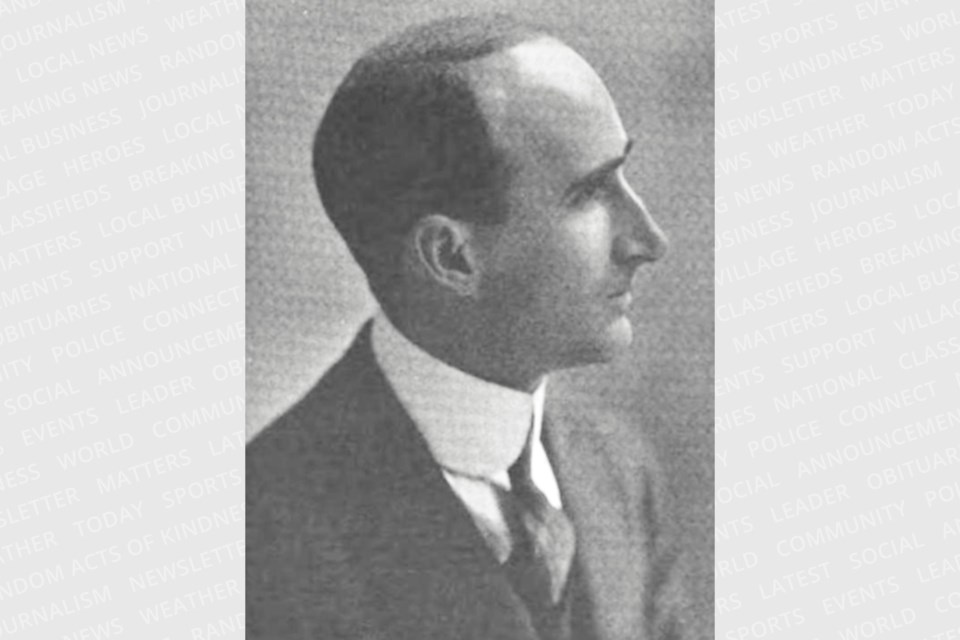On March 16, 1933, Fergus was honoured by a visit from a writer who, in his time, was one of the best-known poets in Canada.
Unlike most poets, he was actually able to make a living from reading fees and the sale of his books. According to Toronto writer John Robert Colombo, “his fame eclipsed that of Robert Service ('The Shooting of Dan McGrew') and Pauline Johnson ('Flint and Feather').” However, unlike Service and Johnson who are both still well-remembered in Canadian literary circles, the man who graced the Fergus High School with his presence that evening has been largely forgotten today.
Perhaps that is because, in the view of some literary critics, he was much better at self-promotion than he was at creating great poetry.
Wilson Pugsley MacDonald was born in Cheapside, Ontario (now part of Haldimand), in 1880. He attended McMaster University in Hamilton, and began publishing poetry in the Toronto Globe before he graduated in 1902. While struggling to establish himself as a recognized poet of significance, he worked at many different jobs.
According to his own account, written later in life, “I have been, in my varied career, a view agent, seaman, cabin-boy, bartender (one night), schoolteacher, actor, inventor, producer, playwright, composer, advertisement writer, newspaper reporter, editorial writer, columnist, banker and poet. When my poetry would not sell, circumstances forced these other tasks upon me.”
Some of MacDonald’s poetry received critical praise, and was even described by esteemed Canadian poet Charles G.D. Roberts as boldly experimental. But much of it was dismissed as what another acclaimed Canadian poet, Douglas (George) Fetherling, called “vapid romanticism.” MacDonald’s epic poem “Niagara” goes in part:
There is a tiger in thy veins, thy tongue
Is white and furred and thou hast often drawn
A draught of human blood and coldly flung
Full many a broken body to the dawn;
The tiger’s eyes are in thy water’s gleam,
The tiger’s purr is in thy warning call.
A tiger leaps when thy soft-footed stream
Takes her long plunge from off thy granite wall.
MacDonald would eventually publish several collections of his poetry. Among them were “The Song of the Prairie Land and Other Poems” (1918), “The Miracle Songs of Jesus” (1921), “Out of the Wilderness” (1926), “A Flagon of Beauty” (1931), “Greater Poems of the Bible” (1943) and “The Lyric Year” (1952).
Once MacDonald had a few volumes of published work under his belt, he decided he should dedicate himself full-time to being a poet. One way for writers to generate income was to go on tour, giving readings and “recitals” in communities large and small. Authors like Charles Dickens, Oscar Wilde and E. Pauline Johnson had been quite successful at touring Canada and the United States.
One problem MacDonald faced was the fact his work was not being taught in schools. He met that challenge by offering to visit schools for free. Instead of being paid a speaker’s fee, he would sell his books as well as items that today would be called “merch.” MacDonald believed many people who might not want to spend money on a book would be willing to buy a single poem, especially if it was illustrated – with his own artwork of course, and signed. He made his recitals more entertaining by following E. Pauline Johnson’s example of turning them into dramatic performances.
Fetherling called MacDonald “a barnstorming versifier with an unbending faith in his own greatness … on stage, he became dynamic; humming, chanting, and singing, he synchronized his whole performance to make poems come alive for his audiences.”
According to an article in the Guelph Mercury, people in Fergus felt privileged to be visited by “the famous Canadian poet, Wilson MacDonald … one of the most outstanding of present day poets.” The paper said his lecture was educational for the students and other Fergus residents in attendance.
MacDonald knew how to play to the room and win over an audience. He began by talking about the fame won by Fergus lacrosse teams. Then he expressed his admiration for the town’s own Dr. Abraham Groves, whose name, he said, “is known in every part of the country.”
MacDonald then discussed what he considered the sad state of poetry in Canada. “Canadians as a whole do not love poetry,” he said, “and do not support their Canadian poets. Their belief that nothing really good can come from the pen of a Canadian poet has caused all the noted Canadian poets to continue their work either in the United States or Europe.”
Talking about his travels around the world, Macdonald said he had never seen any country as beautiful as Northern Ontario. With each poem he recited, he told a background story about what inspired the poem and where he had written it. He recited selections representative of his books. The Mercury reported that MacDonald “showed himself to be an excellent actor” who expressed his poems with “a marked reality.”
At the end of his presentation, MacDonald signed books. The people of Fergus were pleased to have had the honour of a visit from the famous bard.
MacDonald continued to tour and entertain audiences with his poetry until age slowed him down. When he could no longer earn a living as a speaker, a fan club called the Wilson MacDonald Poetry Society supported him. He died in Toronto in 1967. Today a school in Haldimand that he attended as a boy is the Wilson MacDonald Memorial Museum. It honours the poet who once brought his literary art to people in small towns like Fergus.



